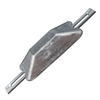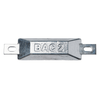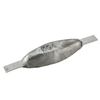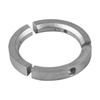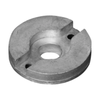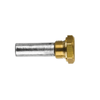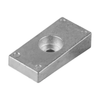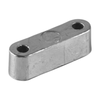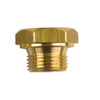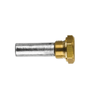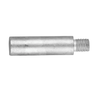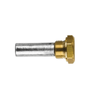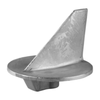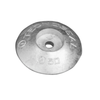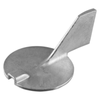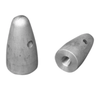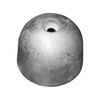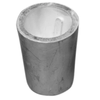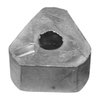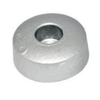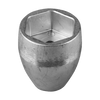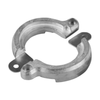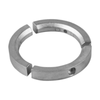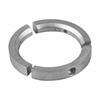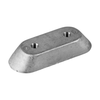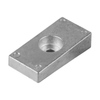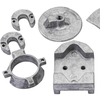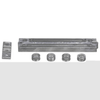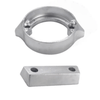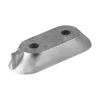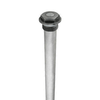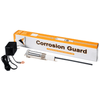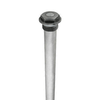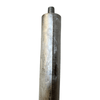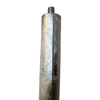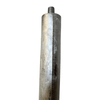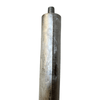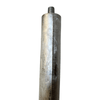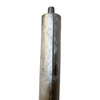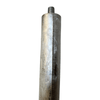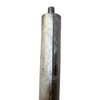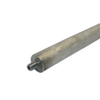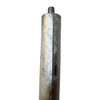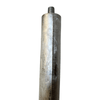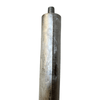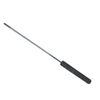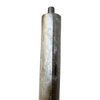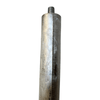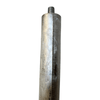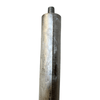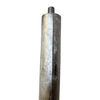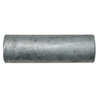Questions about boat anodes
How do I choose the right anode for my boat or ship?
Choosing the right anodes for a boat or ship means you need to consider the type of water it is used in, its surface layer, and which specific parts need to be protected, such as the hull, propeller, rudder, and trim tabs. The water environment plays a crucial role in the choice of suitable anode material to ensure effective corrosion protection. If you are unsure about which type of anode is most suitable or need advice tailored to your specific situation, do not hesitate to contact us. Our experts are here to help you make an informed decision, for optimal protection against corrosion in all types of water.
Do your products meet Mil-Spec?
Yes, all our anodes are designed to meet the highest standards for corrosion protection, including US-MIL (military specification) standards. Mil-Specs are guidelines established by the US Department of Defense to ensure quality, performance, and reliability of military equipment and materials. These specifications cover a wide range of criteria, from manufacturing processes to material composition, and ensure that the products are suitable for demanding military applications. With over 35 years of experience in the industry, we are careful to manufacture and deliver world-class sacrificial anodes.
What is the average lifespan of anodes and what signs should I look for that indicate it's time for a replacement?
The lifespan of anodes is determined by a mix of factors such as the size of the area to be protected, the current requirement of the surface, operating times, and flow rates. Lifespan is often calculated based on individual needs, for example, how long the customer wants the anodes to last. The lifespan can also vary depending on the material and the environment where the vessel operates. Regular inspections at least once a year are crucial to determine the need for replacement, usually when they are about 50% consumed.
How do you evaluate if the current corrosion protection is too low?
Identifying if a boat has too little or too much corrosion protection means observing physical signs and the condition of the anodes. Signs of insufficient protection include, for example, rapid anode consumption or visible corrosion on metallic parts like the hull, propeller, rudder, or trim tabs.
What are the technical differences between zinc, aluminum, and magnesium anodes?
Zinc, aluminum, and magnesium anodes differ primarily in their electrochemical properties, which dictate their protective efficacy in different environments. Zinc anodes, with a potential of -1.1 V compared to a silver/silver chloride (Ag/AgCl) reference electrode, are suitable for saltwater applications but have a relatively fast consumption rate and are less effective in fresh or brackish water. Aluminum anodes, with a more negative potential of about -1.05 to -1.1 V compared to Ag/AgCl, generally offer broader protection, are lighter, and have a slower consumption rate, making them more effective over time. Magnesium anodes, with the most negative potential of -1.55 to -1.75 V compared to Ag/AgCl, are the most active and suitable for freshwater applications, offering the highest level of protection but at the cost of a faster consumption rate. Other factors also play a role, such as how much of the anode surface is freely exposed on the anode.
How do I calculate the necessary number of anodes to ensure complete corrosion protection?
The number of anodes needed for a boat or ship depends on its size and design, the material it is made of, the type of water it navigates in (freshwater, brackish water, or saltwater), and the condition of its protective coatings. If you are unsure, you can always contact our support and if you have a larger vessel, a detailed evaluation by our corrosion experts is recommended to ensure effective and cost-efficient corrosion protection.
Why are anodes necessary for boats?
Anodes are necessary to prevent corrosion, a process where different metals in electrical contact corrode due to electrolytic action when they are submerged in water. Anodes, often made of zinc, aluminum, or magnesium, act as sacrificial metals; they corrode themselves, thereby protecting more noble parts of the boat such as the hull, propeller, and other metallic components submerged in water.
What guidelines exist for optimizing the placement of anodes on a boat for maximum corrosion protection?
The best position for placing anodes depends on the boat's design and the parts most susceptible to corrosion. Typically, anodes are placed on the hull, near the stern, and on or near other metal components in contact with water. The goal is to distribute the anodes evenly to ensure comprehensive protection, focusing on areas that experience high flow rates or turbulence, as these are more prone to corrosion. There are also standards like ISO_20313_2018, DNVGL-CG-0288, DNVGL-RP-B401 2017
Can I paint my anodes?
No, you should not paint your anodes. Painting anodes can insulate them from the water, preventing the electrochemical process necessary for them to protect your boat from corrosion. Anodes need direct contact with water to function effectively.
How do you install anodes?
Here is a general step-by-step guide on mounting anodes. Always check specific recommendations for your boat.
- Installation points: Identify the locations on the metallic surfaces most susceptible to corrosion, such as the hull, propeller shafts, rudders, and trim tabs. Anodes are typically installed following design or in consultation with an expert on cathodic protection
- Prepare the surface: Clean the area where the anode will be attached thoroughly. Remove all paint, rust, and debris to ensure a clean metallic surface
- Place the anode: Position the anode against the clean surface
- Secure the anode: Use the provided bolts or screws to securely attach the anode. For shaft and propeller anodes, ensure they are tightly clamped around the shaft or propeller.
Aluminum or zinc anodes - Which is more suitable?
The choice between aluminum and zinc anodes depends on the type of water the boat operates in and its material. If you are unsure about the best option for your specific situation, you can always contact our experts.
Questions about anode rods for hot water heater
How does an anode work in a water heater?
In a water heater, an anode rod, typically made of magnesium, aluminum, and zinc (cadmium-free), acts as a defense mechanism against corrosion. This is achieved by the anode sacrificing itself and corroding instead of the tank. By sacrificing itself, the anode rod extends the lifespan of the water heater and reduces maintenance. The anode should be checked regularly and replaced when significantly corroded to ensure continuous protection.
How often should the anode rod in a water heater be replaced?
The anode rod in a water heater is recommended to be replaced about every two years, but this can vary depending on water quality, usage patterns, and the specific type of anode material. Regular inspections are recommended; if the rod is significantly corroded, it is time for a replacement to ensure continued protection against corrosion for the water heater.
Why does the anode in a water heater need to be replaced?
The anode rod, often made of magnesium, aluminum, or zinc (cadmium-free), acts as a sacrificial metal that corrodes instead of the tank. Thus, the anode takes the hit instead of your water heater. When the anode is significantly worn, it can no longer effectively attract the corrosive elements in the water, leaving the tank itself vulnerable to corrosion. Regular replacement of the anode rod extends the lifespan of your hot water system by continuing to protect the tank against corrosion, which ultimately saves you money on potential repairs or early replacement of the entire system.
How do you know if the anode in a water heater needs to be replaced and is it worth the cost?
The anode needs to be replaced if you observe any of the following signs: the rod is significantly corroded, more than half of its thickness is worn away, or it is covered in calcium. Additionally, if you start to notice a rotten egg smell in your hot water or faster corrosion of other metallic components in your system, it may indicate that the anode rod is no longer effective. Replacing the anode rod is definitely worth it. It is a cost-effective way to extend the lifespan of your water heater by preventing corrosion of the tank's interior.
What signs signal that it's time to replace the anode in a water heater?
- Visible corrosion: If the anode rod is heavily corroded or sections are missing, it's a clear sign that it needs to be replaced to continue protecting the water heater.
- Reduced size: An anode rod that has worn down to less than half its original diameter can no longer effectively protect against corrosion.
- Calcium buildup: Excessive calcium or other mineral deposits on the rod indicate that it is not functioning effectively and should be replaced.
- Rotten egg smell: A sulfur smell in your hot water can indicate that the anode rod is reacting with bacterial growth.
- Shorter hot water lifespan: If you notice that the hot water doesn't last as long as it used to, it may be a sign that the anode rod is depleted, and the tank is beginning to corrode, reducing efficiency.
How do you install or replace an anode in a water heater?
Installing a new anode rod in your water heater involves several steps, but due to the technical nature of the task and potential safety risks, we strongly recommend that a professional performs the installation.
Read our blog post about water heater anodes here.
Read our installation guide for electronic anodes here.
What is an electronic anode rod for water heaters - and how does it work?
An electronic anode rod for water heaters is a modern alternative to traditional sacrificial anode rods. Instead of relying on a metal that corrodes over time to protect the tank from corrosion, an electronic anode rod uses electrical pulses to prevent the corrosion process. This is done by emitting a small, controlled current through the water, which neutralizes the electrochemical reaction that causes corrosion. Here are 3 benefits of using an electronic anode in your water heater: * Removes bad odor within 24 hours. * Stops corrosion from day 1. * Quick and easy to install.
Which models of water heaters do your anodes fit?
We have anodes that fit most models on the market. In our range, you will also find our electric anode rods for water heaters which are universal, meaning they are flexible and can be used regardless of the water heater model.
What is an electronic anode rod for water heaters - and how does it work?
An electronic anode rod for water heaters is a modern alternative to traditional sacrificial anode rods. Instead of relying on a metal that corrodes over time to protect the tank from corrosion, an electronic anode rod uses electrical pulses to prevent the corrosion process. This is done by emitting a small, controlled current through the water, which neutralizes the electrochemical reaction that causes corrosion. Here you can find our electronic anodes for water heaters. Three advantages of an electronic anode in your water heater:
- Removes bad odor within 24 hours.
- Stops corrosion from day 1.
- Quick and easy to install.
Which models of water heaters do your anodes fit?
We have anodes that fit most models on the market, such as Nibe, A.O. Smith, Bosch, and Whirlpool. In our range, you will also find our electronic anode rods for water heaters that are universal, meaning they are flexible and can be used regardless of the water heater model.
Questions about AnodeFactory
Can AnodeFactory provide customized anode solutions?
Yes, AnodeFactory can provide customized anode solutions tailored to meet our customers' specific needs. We specialize in producing anodes for specialized applications and environments, offering a wide range of materials and coatings. Our team of experts is committed to delivering high-quality anodes designed to exceed expectations and withstand demanding conditions. Contact us today to learn more about our custom anode manufacturing services.
Does Anode Factory offer international shipping?
Of course! We have customers all over the world.
What is your return policy?
For purchases made online, consumers have a 30-day right of withdrawal from the day the item is received. Please note that items purchased from our outlet section are instead subject to a 14-day return right. If you decide to use your right of withdrawal within these 30 days, you will receive a refund of the total amount paid minus a fee of 85 SEK. To qualify for a return, the product must be returned in its original packaging and unused condition. This does not apply to items that have been mounted, installed, or used. To initiate a return, the product must be sent back to us within 14 days from the date the withdrawal was requested. Please contact us if you wish to make a return.
How do I contact customer support?
If you have any questions or need assistance, our support team is ready to help you. We always strive to provide quick responses to ensure that you have the information you need. Contact us by sending an email to support@anodefactory.com
What payment methods do you accept?
We accept American Express, Apple Pay, Google Pay, Maestrocard, Mastercard, PayPal, Union Pay, Visa, and Shop Pay. If you become a corporate customer, you also have the option to pay by invoice.
Do you offer volume discounts for large orders?
Yes, we offer volume discounts for large orders, which is one of the benefits for corporate customers. This is designed to offer cost savings on bulk purchases. For more detailed information about our volume discount policy, please contact us.
What is the warranty period for your products?
We always offer a 3-year warranty period as standard. To file a complaint for a product purchased from us, email support@anodefactory.com with "complaint" in the subject line. Include your order number and a brief description of the issue in the email. Complaints should be made within a reasonable time after the defect was discovered, ideally within 2 months. For more information, read our full terms and conditions.
How do I become a corporate customer?
To become a corporate customer with us at AnodeFactory, please fill in your details here.
What does Anodefactory do to reduce environmental impact as a company?
Our company takes significant steps to reduce environmental impact through the development and application of our corrosion protection products. We are deeply committed to sustainability and environmental responsibility, focusing on the production of eco-friendly and non-toxic solutions for corrosion protection.
What exactly is cathodic protection and why is it important?
Cathodic protection is a technique used to control the corrosion of a metal surface by making it the cathode of an electrochemical cell. It's important because it extends the lifespan of metal structures by preventing corrosion, saving money on repairs and replacements. This method is widely used in various industries, including pipelines, ships, and steel structures that are submerged in water or buried in the ground.

